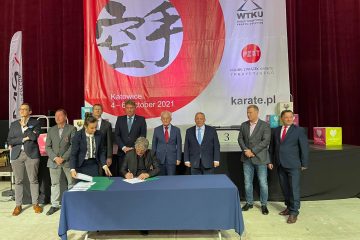Giorgio D’Amico
FKI coach coordinator.
Member of the WFF technical commission.
In this period of lockdown, I found myself with my thoughts on the thing that has been passionate about karate for almost 50 years (January 1973 January 2023).
And of how the recovery could be, my thoughts went towards my students, but not towards the agonists they have competitions to motivate themselves, my thoughts went to all the technicians who after a day’s work find the time (perhaps taking it away from family members) to come to the gym.
I felt compelled to find a working method to be able to awaken their curiosity and turn it into motivation, to be able to meet three times a week and continue to practice again with enthusiasm and joy.
From here came a comparison based on dialogue with practice tests, etc .. an analysis that I called it emerged; CRITICAL ANALYSIS OF KARATE MANAGEMENT on the upper limbs and how the body weight is distributed, what are the parts of the shoulder girdle (not muscles) that make a punch / choko tsuki, a high age uke block or jodan uke / un perform correctly gedan barai / ucci uke etc… how the body weight should be distributed to perform a defense or a strong attack.
And I wondered if so many practitioners have ever asked themselves this question.
The answer, seeing how many still perform tsuki or parades, was negative.
Therefore, the critical analysis of the gestures of karate techniques is intended to be only a principle of evaluation of the motor gestures of our discipline.
This is a summary that may be helpful.
CRITICAL ANALYSIS OF KARATE MANAGEMENT
Having reached a certain point of years of practice, in order to improve it is necessary to understand where the problems are on the gestures and consequently on the execution, evaluating all aspects and why these are not functional.
A single point of view is not enough and is limiting.
Just as a broad vision could provide a quantity of information that could be excessive and misleading.
So we have to ask ourselves some questions that will have to give us answers, which can be transformed into a correct methodology through a periodization of training.
All this represents the fulcrum of the actual study which is mainly based on scientific and not empirical concepts, without being influenced by personal information.
At this point it is necessary to enter into the merits of the individual gestures and execute them with a critical spirit, evaluating their functionality both for quality and effectiveness.
And everything that will come out of it will be useful to us to improve our daily training and our state of health.
By creating an application summary or through the information received, a selection can be made
(this is fine, this is not fine) and to associate the scientific evidence with our experience in the field
(i.e. training) understand their functionality and ability to apply them.
Bearing in mind that the practitioner is at the center of all this, consequently we must take into account many factors: first and foremost physical and structural skills in such a way that the practice does not generate trauma with wrong postures.
Before the advent of the internet, there was no possibility of information, only a few books or magazines, consequently we had to believe what they were telling us.
Today, unfortunately, in the age of the internet, many have remained anchored on obsolete concepts, with everything that today there are seminars of all kinds of practice, but always along the lines of many years ago, and when you propose scientific concepts they look at you with strange eyes and their thought is: but everything that has to do with karate … and to make them understand that the practice is based on scientific concepts and very difficult.
In conclusion, a team work with transversal skills is necessary, (and not a master all-rounder), reasoning by exclusion, eliminating all the superfluous and focusing through specific tests on more realistic principles.
If all this is achieved, it will be a practice that is perfectly applicable in reality.
Therefore, making choices of a scientific nature allows you to continue practicing with awareness in which competence is the main and effective key to success.
Sensei Giorgio D’Amico director of national teams FKI
FKI coach coordinator.
Member of the WFF technical commission.

0 Comments